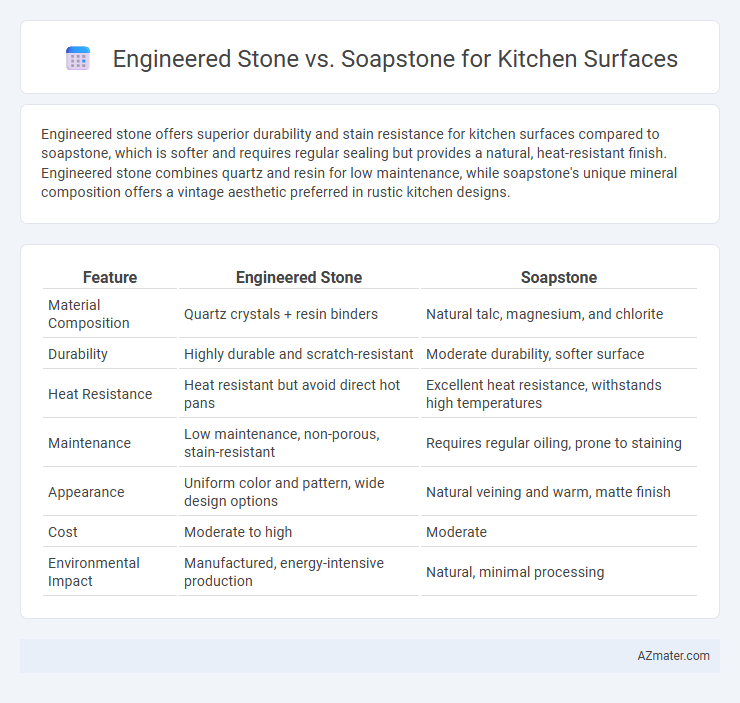Engineered stone offers superior durability and stain resistance for kitchen surfaces compared to soapstone, which is softer and requires regular sealing but provides a natural, heat-resistant finish. Engineered stone combines quartz and resin for low maintenance, while soapstone's unique mineral composition offers a vintage aesthetic preferred in rustic kitchen designs.
Table of Comparison
| Feature | Engineered Stone | Soapstone |
|---|---|---|
| Material Composition | Quartz crystals + resin binders | Natural talc, magnesium, and chlorite |
| Durability | Highly durable and scratch-resistant | Moderate durability, softer surface |
| Heat Resistance | Heat resistant but avoid direct hot pans | Excellent heat resistance, withstands high temperatures |
| Maintenance | Low maintenance, non-porous, stain-resistant | Requires regular oiling, prone to staining |
| Appearance | Uniform color and pattern, wide design options | Natural veining and warm, matte finish |
| Cost | Moderate to high | Moderate |
| Environmental Impact | Manufactured, energy-intensive production | Natural, minimal processing |
Introduction to Engineered Stone and Soapstone
Engineered stone, composed of crushed quartz and resin, offers exceptional durability, non-porous surface, and a wide variety of colors and patterns ideal for kitchen countertops. Soapstone, a natural metamorphic rock rich in talc, features a soft, smooth texture with excellent heat resistance and a unique, matte finish that darkens over time. Both materials provide excellent options for kitchen surfaces, with engineered stone excelling in stain resistance and soapstone showcasing natural beauty and thermal stability.
Material Composition and Manufacturing
Engineered stone is composed of crushed natural quartz combined with resin and pigments, offering high durability and uniformity through a manufacturing process involving mixing, molding, and curing under strict conditions. Soapstone, a natural metamorphic rock primarily made of talc, is quarried and hand-cut or machine-cut without synthetic additives, providing a softer, heat-resistant surface with unique veining. The engineered stone's manufacturing allows customization in color and pattern, while soapstone's natural formation results in organic variations and a matte finish ideal for traditional kitchen designs.
Aesthetic Appeal: Colors and Patterns
Engineered stone offers a wide range of vibrant colors and consistent patterns, making it ideal for modern kitchen surfaces seeking uniformity and bold aesthetic appeal. Soapstone features natural, muted tones with unique veining that deepens over time, providing a timeless, rustic charm perfect for classic or farmhouse kitchen designs. The choice between engineered stone and soapstone depends on preference for either customizable color options or the organic, evolving beauty of natural stone.
Durability and Scratch Resistance
Engineered stone offers superior durability and scratch resistance compared to soapstone, making it a popular choice for high-traffic kitchen surfaces. Composed of crushed quartz and resins, engineered stone resists chipping and staining while maintaining a hard, non-porous surface. Soapstone, although heat-resistant and softer with a natural feel, is more prone to scratches and requires regular maintenance to preserve its appearance.
Heat and Stain Resistance
Engineered stone offers superior heat resistance withstanding temperatures up to 150degC without damage, while soapstone resists heat well but may darken or develop marks under prolonged exposure to high heat. In terms of stain resistance, engineered stone is non-porous and highly resistant to stains from common kitchen substances like wine, oil, and acids, requiring minimal maintenance. Soapstone is naturally low-porosity and resistant to stains but can absorb oils and liquids if not regularly sealed, necessitating periodic treatment to maintain its appearance.
Maintenance and Cleaning Requirements
Engineered stone requires regular wiping with mild soap and water to prevent staining, and it is resistant to most household chemicals, making maintenance straightforward. Soapstone demands periodic oiling to maintain its rich color and needs gentle cleaning with non-abrasive soap, as it is softer and more prone to scratches than engineered stone. Both surfaces benefit from prompt spill cleanup, but soapstone's natural patina can deepen with age, while engineered stone retains a more consistent appearance over time.
Cost Comparison and Value
Engineered stone typically costs between $50 and $100 per square foot, offering a durable, low-maintenance surface with consistent patterns, while soapstone ranges from $70 to $120 per square foot, valued for its natural look and heat resistance but requires regular sealing. Engineered stone provides better value for homeowners seeking scratch and stain resistance with less upkeep. Soapstone holds long-term value for those prioritizing a unique, natural aesthetic despite higher maintenance and initial cost.
Installation Process and Flexibility
Engineered stone offers a streamlined installation process with precast slabs that fit standard kitchen dimensions, requiring professional precision to ensure seamless joints and proper adhesive use. Soapstone is softer and more malleable, allowing easier cutting and shaping during installation, which provides greater flexibility for custom edges and integrated sinks without specialized tools. Both materials demand professional installation for optimal durability, but soapstone's workability offers more adaptability in complex kitchen layouts.
Environmental Impact and Sustainability
Engineered stone surfaces, primarily composed of quartz and resins, often have a higher environmental footprint due to energy-intensive manufacturing and non-biodegradable components. Soapstone, a natural metamorphic rock, offers greater sustainability with minimal processing requirements and a longer lifespan that reduces the need for replacement. Choosing soapstone over engineered stone can lower carbon emissions and waste, aligning better with eco-friendly kitchen surface options.
Which Surface Is Best for Your Kitchen?
Engineered stone offers superior durability and stain resistance, making it ideal for high-traffic kitchens that demand a low-maintenance surface. Soapstone, known for its natural heat resistance and unique matte finish, provides a softer, more tactile surface that develops a charming patina over time. Choosing the best kitchen surface depends on your priorities for maintenance, aesthetics, and durability; engineered stone suits modern, robust kitchens, while soapstone appeals to those seeking a warm, natural look with gentle wear characteristics.

Infographic: Engineered stone vs Soapstone for Kitchen Surface
 azmater.com
azmater.com